| Listing 1 - 10 of 21 | << page >> |
Sort by
|
Book
ISBN: 093461363X 9780934613637 Year: 1988 Publisher: San Mateo, Calif. Kaufmann
Abstract | Keywords | Export | Availability | Bookmark
 Loading...
Loading...Choose an application
- Reference Manager
- EndNote
- RefWorks (Direct export to RefWorks)
Artificial intelligence. Robotics. Simulation. Graphics --- 681.3*I211 --- Distributed artificial intelligence --- Problem solving --- -Methodology --- Psychology --- Decision making --- Executive functions (Neuropsychology) --- DAI (Artificial intelligence) --- Distributed AI (Artificial intelligence) --- Artificial intelligence --- Computerwetenschap--?*I211 --- Data processing --- Distributed artificial intelligence. --- Data processing. --- -Computerwetenschap--?*I211 --- Blackboard --- Mace --- actors --- Abe --- Cops --- Proceedings --- Parallelism --- Dai --- Problem solving-data processing
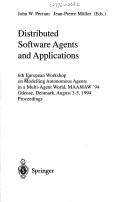
ISBN: 3540611576 3540683356 9783540611578 Year: 1996 Volume: 1069 Publisher: Berlin [etc.] : Springer-Verlag,
Abstract | Keywords | Export | Availability | Bookmark
 Loading...
Loading...Choose an application
- Reference Manager
- EndNote
- RefWorks (Direct export to RefWorks)
"This book constitutes the refereed proceedings of the 6th European Workshop on Modelling Autonomous Agents in a Multi-Agent World, MAAMAW '94, held in Odense, Denmark, in August 1994. The 15 revised full papers included in the book were carefully selected from the workshop contributions; they address various current aspects of multi-agent systems, with a certain focus on applicational aspects. In addition, there is an invited paper "Agents: towards a society in which humans and computers cohabitate" by Mario Tokoro."--PUBLISHER'S WEBSITE
Distributed artificial intelligence --- Congresses. --- Industrial applications --- Congresses --- Artificial intelligence. --- Software engineering. --- Computer Communication Networks. --- Artificial Intelligence. --- Software Engineering. --- Computer software engineering --- Engineering --- AI (Artificial intelligence) --- Artificial thinking --- Electronic brains --- Intellectronics --- Intelligence, Artificial --- Intelligent machines --- Machine intelligence --- Thinking, Artificial --- Bionics --- Cognitive science --- Digital computer simulation --- Electronic data processing --- Logic machines --- Machine theory --- Self-organizing systems --- Simulation methods --- Fifth generation computers --- Neural computers --- DAI (Artificial intelligence) --- Distributed AI (Artificial intelligence) --- Artificial intelligence --- Distributed artificial intelligence - Congresses. --- Distributed artificial intelligence - Industrial applications - Congresses.
Book
ISBN: 9783319112275 3319112260 9783319112268 3319112279 Year: 2015 Publisher: Cham : Springer International Publishing : Imprint: Springer,
Abstract | Keywords | Export | Availability | Bookmark
 Loading...
Loading...Choose an application
- Reference Manager
- EndNote
- RefWorks (Direct export to RefWorks)
This book contains a selection of refereed and revised papers of the Intelligent Distributed Computing Track originally presented at the third International Symposium on Intelligent Informatics (ISI-2014), September 24-27, 2014, Delhi, India. The papers selected for this Track cover several Distributed Computing and related topics including Peer-to-Peer Networks, Cloud Computing, Mobile Clouds, Wireless Sensor Networks, and their applications.
Engineering. --- Computational Intelligence. --- Artificial Intelligence (incl. Robotics). --- Artificial intelligence. --- Ingénierie --- Intelligence artificielle --- Engineering & Applied Sciences --- Computer Science --- Computational intelligence. --- Electronic data processing --- Distributed artificial intelligence. --- Distributed processing. --- DAI (Artificial intelligence) --- Distributed AI (Artificial intelligence) --- Distributed computer systems in electronic data processing --- Distributed computing --- Distributed processing in electronic data processing --- Intelligence, Computational --- Artificial intelligence --- AI (Artificial intelligence) --- Artificial thinking --- Electronic brains --- Intellectronics --- Intelligence, Artificial --- Intelligent machines --- Machine intelligence --- Thinking, Artificial --- Bionics --- Cognitive science --- Digital computer simulation --- Logic machines --- Machine theory --- Self-organizing systems --- Simulation methods --- Fifth generation computers --- Neural computers --- Construction --- Industrial arts --- Technology --- Soft computing --- Computer networks --- Artificial Intelligence.
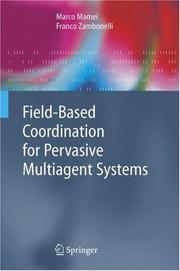
ISBN: 1280608676 9786610608676 3540279695 3540279687 3642066232 Year: 2006 Publisher: Berlin ; New York : Springer,
Abstract | Keywords | Export | Availability | Bookmark
 Loading...
Loading...Choose an application
- Reference Manager
- EndNote
- RefWorks (Direct export to RefWorks)
More and more, software systems involve autonomous and distributed software components that have to execute and interact in open and dynamic environments, such as in pervasive, autonomous, and mobile applications. The requirements with respect to dynamics, openness, scalability, and decentralization call for new approaches to software design and development, capable of supporting spontaneous configuration, tolerating partial failures, or arranging adaptive reorganization of the whole system. Inspired by the behaviour of complex natural systems, scientists and engineers have started to adjust their mechanisms and techniques for self-organization and adaption to changing environments. In line with these considerations, Mamei and Zambonelli propose an interaction model inspired by the way masses and particles in our universe move and self-organize according to contextual information represented by gravitational and electromagnetic fields. The key idea is to have the components’ actions driven by computational force fields, generated by the components themselves or by some infrastructures, and propagated across the environment. Together with its supporting middleware infrastructure – available with additional information under http://www.agentgroup.unimore.it – this model can serve as the basis for a general purpose and widely applicable approach for the design and development of adaptive distributed applications.
Evolutionary programming (Computer science) --- Adaptive computing systems --- Distributed artificial intelligence. --- Embedded computer systems --- Design. --- Programming. --- DAI (Artificial intelligence) --- Distributed AI (Artificial intelligence) --- Artificial intelligence --- Adaptive computing --- Configurable computing systems --- Reconfigurable computing systems --- Computer systems --- Computer programming --- Information Technology --- Artificial Intelligence --- Artificial intelligence. --- Computer Communication Networks. --- Software engineering. --- Artificial Intelligence. --- Software Engineering. --- Computer software engineering --- Engineering --- AI (Artificial intelligence) --- Artificial thinking --- Electronic brains --- Intellectronics --- Intelligence, Artificial --- Intelligent machines --- Machine intelligence --- Thinking, Artificial --- Bionics --- Cognitive science --- Digital computer simulation --- Electronic data processing --- Logic machines --- Machine theory --- Self-organizing systems --- Simulation methods --- Fifth generation computers --- Neural computers --- Computer communication systems. --- Communication systems, Computer --- Computer communication systems --- Data networks, Computer --- ECNs (Electronic communication networks) --- Electronic communication networks --- Networks, Computer --- Teleprocessing networks --- Data transmission systems --- Digital communications --- Electronic systems --- Information networks --- Telecommunication --- Cyberinfrastructure --- Network computers --- Distributed processing
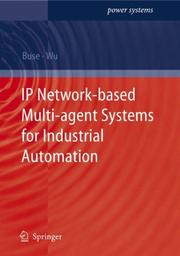
ISBN: 128080405X 9786610804054 1846286476 1846286468 1849966354 Year: 2007 Publisher: London : Springer,
Abstract | Keywords | Export | Availability | Bookmark
 Loading...
Loading...Choose an application
- Reference Manager
- EndNote
- RefWorks (Direct export to RefWorks)
A mobile agent is a software program with the capability to suspend its execution and resume it on another computer. Agents are a relatively recent development in computer science, which have become a popular and useful methodology for the modelling and implementation of distributed systems, particularly those consisting of a number of largely autonomous components. The extensive use of multi-agent systems in various areas including information management, industrial control and manufacturing systems, suggests that the multi-agent systems methodology may also be appropriate for the design of power system automation systems. IP Network-based Multi-agent Systems for Industrial Automation is the first book to present an introduction to the use of the Internet protocol suite and multi-agent systems for the information management, online monitoring and control of distributed power system substations. An open architecture is proposed, in which mobile agents are applied to the retrieval and analysis of substation data, and to remote operator intervention. A prototype implementation of this architecture is also described, which has been demonstrated and evaluated using a substation simulator. IP Network-based Multi-agent Systems for Industrial Automation is an excellent reference for postgraduates, researchers and academics in engineering and computer science, as well as engineers in system automation and managers in distributed industrial systems.
Electric substations --- Intelligent agents (Computer software) --- Electric power transmission --- Distributed artificial intelligence. --- Automatic control. --- Computer network resources. --- Data processing. --- DAI (Artificial intelligence) --- Distributed AI (Artificial intelligence) --- Artificial intelligence --- Electricity --- Power transmission, Electric --- Electric power systems --- Electric lines --- Electric power distribution --- Agents, Autonomous (Computer software) --- Agents, Cognitive (Computer software) --- Agents, Intelligent (Computer software) --- Assistants, Cognitive (Computer software) --- Assistants, Intelligent software --- Autonomous agents (Computer software) --- Cognitive agents (Computer software) --- Cognitive assistants (Computer software) --- IAs (Computer software) --- Intelligent agent software --- Intelligent software agents --- Intelligent software assistants --- Software agents (Computer software) --- Special agents (Computer software) --- Stations, Electric (Substations) --- Substations, Electric --- Transmission --- Computer programs --- Production of electric energy or. --- Control, Robotics, Mechatronics. --- Information Systems Applications (incl. Internet). --- Power Electronics, Electrical Machines and Networks. --- Control engineering. --- Robotics. --- Mechatronics. --- Application software. --- Power electronics. --- Electronics, Power --- Electric power --- Electronics --- Application computer programs --- Application computer software --- Applications software --- Apps (Computer software) --- Computer software --- Mechanical engineering --- Microelectronics --- Microelectromechanical systems --- Automation --- Machine theory --- Control engineering --- Control equipment --- Control theory --- Engineering instruments --- Programmable controllers
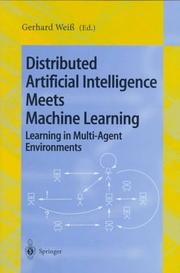
ISBN: 3540629343 3540690506 9783540629344 Year: 1997 Volume: 1221 1221 Publisher: Berlin, Heidelberg : Springer Berlin Heidelberg : Imprint: Springer,
Abstract | Keywords | Export | Availability | Bookmark
 Loading...
Loading...Choose an application
- Reference Manager
- EndNote
- RefWorks (Direct export to RefWorks)
The complexity of systems studied in distributed artificial intelligence (DAI), such as multi-agent systems, often makes it extremely difficult or even impossible to correctly and completely specify their behavioral repertoires and dynamics. There is broad agreement that such systems should be equipped with the ability to learn in order to improve their future performance autonomously. The interdisciplinary cooperation of researchers from DAI and machine learning (ML) has established a new and very active area of research and development enjoying steadily increasing attention from both communities. This state-of-the-art report documents current and ongoing developments in the area of learning in DAI systems. It is indispensable reading for anybody active in the area and will serve as a valuable source of information.
Machine learning --- Distributed artificial intelligence --- Computer Science --- Engineering & Applied Sciences --- 681.3*I2 <063> --- Learning, Machine --- Artificial intelligence --- Machine theory --- DAI (Artificial intelligence) --- Distributed AI (Artificial intelligence) --- Artificial intelligence. AI--Congressen --- 681.3*I2 <063> Artificial intelligence. AI--Congressen --- Computer science. --- Programming languages (Electronic computers). --- Artificial intelligence. --- Computer simulation. --- Computer Science. --- Artificial Intelligence (incl. Robotics). --- Simulation and Modeling. --- Programming Languages, Compilers, Interpreters. --- Computer modeling --- Computer models --- Modeling, Computer --- Models, Computer --- Simulation, Computer --- Electromechanical analogies --- Mathematical models --- Simulation methods --- Model-integrated computing --- AI (Artificial intelligence) --- Artificial thinking --- Electronic brains --- Intellectronics --- Intelligence, Artificial --- Intelligent machines --- Machine intelligence --- Thinking, Artificial --- Bionics --- Cognitive science --- Digital computer simulation --- Electronic data processing --- Logic machines --- Self-organizing systems --- Fifth generation computers --- Neural computers --- Computer languages --- Computer program languages --- Computer programming languages --- Machine language --- Languages, Artificial --- Informatics --- Science --- Congresses --- Artificial Intelligence. --- Machine learning - Congresses --- Distributed artificial intelligence - Congresses
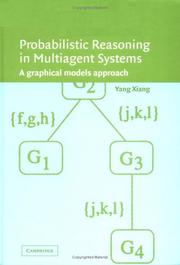
ISBN: 0521813085 0511020740 0521153905 9786610434039 0511177720 0511148127 0511305168 0511546939 1280434031 0511045441 9780511020742 9780511045448 9780521813082 9780511148125 9780511546938 9781280434037 9780521153904 1107133157 9781107133150 6610434034 9780511177729 9780511305160 Year: 2002 Publisher: Cambridge New York Cambridge University Press
Abstract | Keywords | Export | Availability | Bookmark
 Loading...
Loading...Choose an application
- Reference Manager
- EndNote
- RefWorks (Direct export to RefWorks)
This 2002 book investigates the opportunities in building intelligent decision support systems offered by multi-agent distributed probabilistic reasoning. Probabilistic reasoning with graphical models, also known as Bayesian networks or belief networks, has become increasingly an active field of research and practice in artificial intelligence, operations research and statistics. The success of this technique in modeling intelligent decision support systems under the centralized and single-agent paradigm has been striking. Yang Xiang extends graphical dependence models to the distributed and multi-agent paradigm. He identifies the major technical challenges involved in such an endeavor and presents the results. The framework developed in the book allows distributed representation of uncertain knowledge on a large and complex environment embedded in multiple cooperative agents, and effective, exact and distributed probabilistic inference.
Distributed artificial intelligence --- Bayesian statistical decision theory --- Intelligent agents (Computer software) --- Intelligence artificielle répartie --- Statistique bayésienne --- Agents intelligents (logiciels) --- Data processing --- Informatique --- Information Technology --- Computer Science (Hardware & Networks) --- Distributed artificial intelligence. --- Intelligent agents (Computer software). --- Computer Science --- Engineering & Applied Sciences --- Data processing. --- Intelligence artificielle répartie --- Statistique bayésienne --- Agents, Autonomous (Computer software) --- Agents, Cognitive (Computer software) --- Agents, Intelligent (Computer software) --- Assistants, Cognitive (Computer software) --- Assistants, Intelligent software --- Autonomous agents (Computer software) --- Cognitive agents (Computer software) --- Cognitive assistants (Computer software) --- IAs (Computer software) --- Intelligent agent software --- Intelligent software agents --- Intelligent software assistants --- Software agents (Computer software) --- Special agents (Computer software) --- Bayes' solution --- Bayesian analysis --- DAI (Artificial intelligence) --- Distributed AI (Artificial intelligence) --- Artificial intelligence --- Statistical decision --- Computer programs --- E-books --- Multiagent systems. --- Agent-based model (Computer software) --- MASs (Multiagent systems) --- Multi-agent systems --- Systems, Multiagent
Book
ISBN: 1489983058 0387777016 0387777024 Year: 2009 Publisher: New York : Springer Science+Business Media,
Abstract | Keywords | Export | Availability | Bookmark
 Loading...
Loading...Choose an application
- Reference Manager
- EndNote
- RefWorks (Direct export to RefWorks)
Distributed Intelligent Systems: A Coordination Perspective addresses and comprehensively answers commonly asked questions about coordination in agent-oriented distributed systems. Characterizing the state-of-the-art research in the field of coordination with regard to the development of distributed agent-oriented systems is a particularly complex endeavour, as the space of available approaches is indeed considerable, and research is independently conducted in a great number of domains. While existing books deal with specific aspects of coordination, the major contribution of this book lies in the attempt to provide an in-depth review covering a wide range of issues regarding multi-agent coordination in Distributed Artificial Intelligence. In addition to reporting various sources of confusion, this book outlines the existence of a plethora of strategies and techniques adapted to different problems, agent-oriented systems, environments, and domains. In short, the current book identifies the absence of a single unified approach in addressing multi-agent coordination problems arising in any system or organization. This book, written by world-class leaders in this field, dedicates itself to providing a state-of-the-art review of current coordination strategies and techniques. The book also describes a broad range of application domains which implement many of the coordination strategies and techniques from the field of multi-agent systems. The application domains include defense, transportation, health care, telecommunication and e-business. Based on current practical deployed applications and existing capabilities, this book also identifies and thoroughly examines trends, challenges, and future agent-oriented research directions. Key features: Unveils the lack of coherence and order that characterizes the area of research pertaining to coordination of distributed intelligent systems Examines coordination models, frameworks, strategies and techniques to enable the development of distributed intelligent agent-oriented systems. Provides specific recommendations to realize more widespread deployment of agent-based systems Distributed Intelligent Systems: A Coordination Perspective is designed for a professional audience composed of practitioners and researchers in industry. This book is also suitable as a reference or secondary textbook for advanced-level students in computer science and engineering.
Distributed artificial intelligence. --- Intelligent agents (Computer software). --- Distributed artificial intelligence --- Intelligent agents (Computer software) --- Computer Science --- Mechanical Engineering - General --- Engineering & Applied Sciences --- Mechanical Engineering --- Information Technology --- Artificial Intelligence --- Intelligent control systems. --- Intelligent control --- Intelligent controllers --- DAI (Artificial intelligence) --- Distributed AI (Artificial intelligence) --- Computer science. --- Computer organization. --- Computer communication systems. --- Operating systems (Computers). --- Computers. --- Artificial intelligence. --- Computer Science. --- Artificial Intelligence (incl. Robotics). --- Computer Communication Networks. --- Operating Systems. --- Computer Systems Organization and Communication Networks. --- Information Systems and Communication Service. --- Automatic control --- Artificial intelligence --- Computer network architectures. --- Information systems. --- Artificial Intelligence. --- Architectures, Computer network --- Network architectures, Computer --- Computer architecture --- Computer operating systems --- Computers --- Disk operating systems --- Systems software --- AI (Artificial intelligence) --- Artificial thinking --- Electronic brains --- Intellectronics --- Intelligence, Artificial --- Intelligent machines --- Machine intelligence --- Thinking, Artificial --- Bionics --- Cognitive science --- Digital computer simulation --- Electronic data processing --- Logic machines --- Machine theory --- Self-organizing systems --- Simulation methods --- Fifth generation computers --- Neural computers --- Operating systems
Book
ISBN: 3662490161 366249017X Year: 2015 Publisher: Berlin, Heidelberg : Springer Berlin Heidelberg : Imprint: Springer,
Abstract | Keywords | Export | Availability | Bookmark
 Loading...
Loading...Choose an application
- Reference Manager
- EndNote
- RefWorks (Direct export to RefWorks)
These transactions publish research in computer-based methods of computational collective intelligence (CCI) and their applications in a wide range of fields such as the semantic Web, social networks, and multi-agent systems. TCCI strives to cover new methodological, theoretical and practical aspects of CCI understood as the form of intelligence that emerges from the collaboration and competition of many individuals (artificial and/or natural). The application of multiple computational intelligence technologies, such as fuzzy systems, evolutionary computation, neural systems, consensus theory, etc., aims to support human and other collective intelligence and to create new forms of CCI in natural and/or artificial systems. This nineteenth issue contains 11 carefully selected and revised contributions.
Computer Science --- Mechanical Engineering - General --- Engineering & Applied Sciences --- Mechanical Engineering --- Computer science. --- Software engineering. --- Computers. --- Artificial intelligence. --- Computer simulation. --- Computational intelligence. --- Computer Science. --- Artificial Intelligence (incl. Robotics). --- Computational Intelligence. --- Software Engineering. --- Computation by Abstract Devices. --- Simulation and Modeling. --- Information Systems and Communication Service. --- Intelligence, Computational --- Artificial intelligence --- Computer modeling --- Computer models --- Modeling, Computer --- Models, Computer --- Simulation, Computer --- Electromechanical analogies --- Mathematical models --- Simulation methods --- Model-integrated computing --- AI (Artificial intelligence) --- Artificial thinking --- Electronic brains --- Intellectronics --- Intelligence, Artificial --- Intelligent machines --- Machine intelligence --- Thinking, Artificial --- Bionics --- Cognitive science --- Digital computer simulation --- Electronic data processing --- Logic machines --- Machine theory --- Self-organizing systems --- Fifth generation computers --- Neural computers --- Automatic computers --- Automatic data processors --- Computer hardware --- Computing machines (Computers) --- Electronic calculating-machines --- Electronic computers --- Hardware, Computer --- Computer systems --- Cybernetics --- Calculators --- Cyberspace --- Computer software engineering --- Engineering --- Informatics --- Science --- Soft computing --- Engineering. --- Information systems. --- Artificial Intelligence. --- Construction --- Industrial arts --- Technology --- Distributed artificial intelligence. --- DAI (Artificial intelligence) --- Distributed AI (Artificial intelligence)
Book
ISBN: 3642205356 3642205364 Year: 2011 Publisher: Berlin ; Heidelberg : Springer-Verlag,
Abstract | Keywords | Export | Availability | Bookmark
 Loading...
Loading...Choose an application
- Reference Manager
- EndNote
- RefWorks (Direct export to RefWorks)
Civil engineering structures such as buildings, bridges, stadiums, and offshore structures play an import role in our daily life. However, constructing these structures requires lots of budget. Thus, how to cost-efficiently design structures satisfying all required design constraints is an important factor to structural engineers. Traditionally, mathematical gradient-based optimal techniques have been applied to the design of optimal structures. While, many practical engineering optimal problems are very complex and hard to solve by traditional method. In the past few decades, swarm intelligence algorithms, which were inspired by the social behaviour of natural animals such as fish schooling and bird flocking, were developed because they do not require conventional mathematical assumptions and thus possess better global search abilities than the traditional optimization algorithms and have attracted more and more attention. These intelligent based algorithms are very suitable for continuous and discrete design variable problems such as ready-made structural members and have been vigorously applied to various structural design problems and obtained good results. This book gathers the authors’ latest research work related with particle swarm optimizer algorithm and group search optimizer algorithm as well as their application to structural optimal design. The readers can understand the full spectrum of the algorithms and apply the algorithms to their own research problems. .
Fluid dynamics -- Mathematics. --- Mathematical optimization. --- Shape theory (Topology). --- Engineering & Applied Sciences --- Computer Science --- Distributed artificial intelligence. --- Swarm intelligence. --- Collective intelligence --- DAI (Artificial intelligence) --- Distributed AI (Artificial intelligence) --- Engineering. --- Artificial intelligence. --- Computational intelligence. --- Structural mechanics. --- Civil engineering. --- Computational Intelligence. --- Artificial Intelligence (incl. Robotics). --- Civil Engineering. --- Structural Mechanics. --- Engineering --- Public works --- Architectural engineering --- Engineering, Architectural --- Structural mechanics --- Structures, Theory of --- Structural engineering --- Intelligence, Computational --- Artificial intelligence --- Soft computing --- AI (Artificial intelligence) --- Artificial thinking --- Electronic brains --- Intellectronics --- Intelligence, Artificial --- Intelligent machines --- Machine intelligence --- Thinking, Artificial --- Bionics --- Cognitive science --- Digital computer simulation --- Electronic data processing --- Logic machines --- Machine theory --- Self-organizing systems --- Simulation methods --- Fifth generation computers --- Neural computers --- Construction --- Industrial arts --- Technology --- Cellular automata --- Distributed artificial intelligence --- Mechanics. --- Mechanics, Applied. --- Artificial Intelligence. --- Solid Mechanics. --- Applied mechanics --- Engineering, Mechanical --- Engineering mathematics --- Classical mechanics --- Newtonian mechanics --- Physics --- Dynamics --- Quantum theory
| Listing 1 - 10 of 21 | << page >> |
Sort by
|

 Search
Search Feedback
Feedback About UniCat
About UniCat  Help
Help News
News